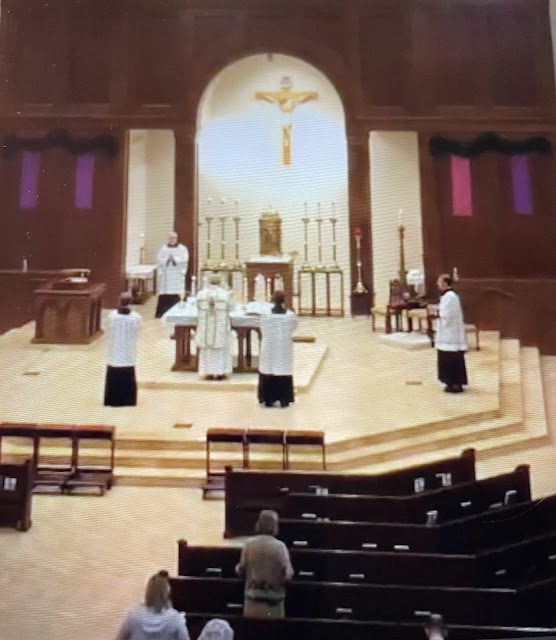At Saint Anne’s and with my bishop’s approval, we celebrate the Latin Modern Mass with Latin Ancient Mass sensibilities. At our All Souls’ Mass, the choir chanted the Propers from the 1974 Graduale Romanum, the Gradual replaced the Responsorial Psalm and the Dies Irae Tract was chanted.
The Introductory Rite up to the absolution is ad orientem and at the foot of the altar. The Kyrie was chanted as the priest ascended the altar and the Collect is prayed at the Epistle Side of the Altar.
The Liturgy of the Word was from the Ambo in the vernacular (except for the Gradual) as is normal for the Modern Mass.
Without further description, this Mass appears, for the most part, to be the Latin Ancient Mass but it is the Latin Modern Mass.
But here’s the point, many who participated in the All Souls’ Mass said to me afterward that they had not been to a Latin Mass (meaning the pre-Vatican II Mass) since the mid 1960’s. They exclaimed how beautiful and reverent it was and inspiring to them. Many were brought to tears.
Recently our diocesan monthly magazine, The Southern Cross, focused on the Eucharist. One exceptional article by our retired priest, Father Doug Clark, was excellent in providing the understanding of the structure and theology of the Modern Mass with an emphasis on Transubstantiation. It was straight forward, erudite and orthodox.
But I found it only to be academic and descriptive which an atheist would appreciate learning about from an educational point of view. It did not move beyond that to touch the heart and soul, to move a person to an experience of faith, awe, reverence and wonder. That’s the problem with the Modern Mass.
The problems include, also, too many variabilities to include what I do for our Latin Modern Masses. But our All Souls Mass and our Latin Modern Low Mass each Tuesday touch more the heart and soul rather than the mind and intellect. That is what needs to be recovered. Of course it isn’t either/or but both/and.
Yes, Father Fox says no one is pleased with the Modern Mass as everyone wants to do something either to change it or improve it. That’s a huge problem and bespeaks of the undergirding problems of the Modern Mass. There is only one person who can change that and it is the pope. He seems preoccupied with other concerns presently.
We do need to get the priests’ personalities out of the celebration of the Mass and to challenge the laity who love the antics of various celebrants to examine why they do so and why it is so alien to authentic Catholic worship and the experience of liturgy.
How do you do that in the present climate of the clerical cult of the priestly personality during Mass?
Ad orientem eliminates that for the most part. Also saying the black and doing the red does too.
But what is good about the flexibility of the Modern Mass is that good things can be chosen as an option. Eventually, I would like our Tuesday Latin Modern Mass to be more like the 1965’s revision of the 1962 Roman Missal—the changing parts of the Mass in the vernacular.
Then Vatican II’s vision for the “reform” of the Mass would be realized in a perfect way.



2 comments:
Father McDonald,
Very well said. If the Church had followed this path in 1965 we may have avoided the liturgical wars and the loss of millions of Catholics. Most priests handled the changes well and with dignity yet millions walked away. I think for many the loss of mystery and a sense of the sacred was difficult to handle. Keep up your good work
Fair enough, but unless you make this the default position for the principal Sunday Mass rather than shunting it to a weekday or dusting it off for special occasions (which conveniently fall on a weekday) you're not getting through to a lot of people.
Take Easter Sunday, where the Graduale Propers are the same in both forms. By all means sing the Mass in English, which would include the sung Gospel. But precede the Mass with the older rite's Vidi Aquam, use Mass I (lux et origo) for the sung Ordinary, and use the Graduale chants for the Introit, Gradual, Alleluia, Sequence, Offertory and Communion. If you want, celebrate 'ad orientem' but resist the temptation to tweak the OF's rubrics. Finish with a vernacular hymn (there is no 'recessional' in either form).
This is 'saying the black and doing the red', has a reasonable balance of Latin and English, and is fully in conformity with the 1970 Missal. What's not to like?
Post a Comment